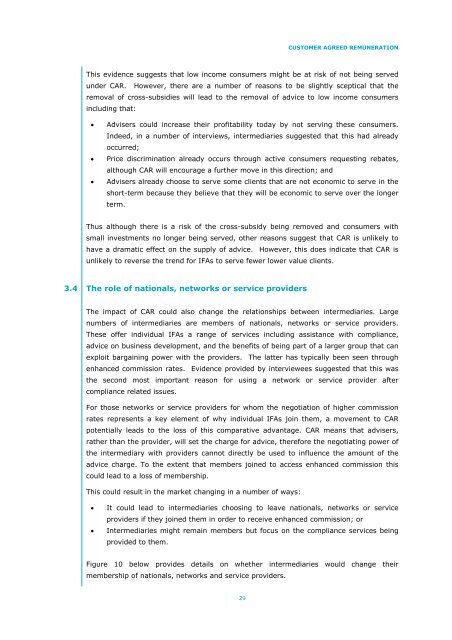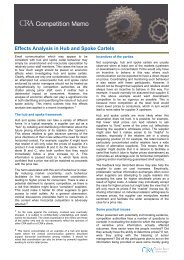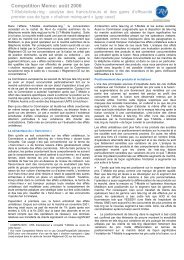CUSTOMER AGREED REMUNERATION - CRA International
CUSTOMER AGREED REMUNERATION - CRA International
CUSTOMER AGREED REMUNERATION - CRA International
You also want an ePaper? Increase the reach of your titles
YUMPU automatically turns print PDFs into web optimized ePapers that Google loves.
<strong>CUSTOMER</strong> <strong>AGREED</strong> <strong>REMUNERATION</strong><br />
This evidence suggests that low income consumers might be at risk of not being served<br />
under CAR. However, there are a number of reasons to be slightly sceptical that the<br />
removal of cross-subsidies will lead to the removal of advice to low income consumers<br />
including that:<br />
• Advisers could increase their profitability today by not serving these consumers.<br />
Indeed, in a number of interviews, intermediaries suggested that this had already<br />
occurred;<br />
• Price discrimination already occurs through active consumers requesting rebates,<br />
although CAR will encourage a further move in this direction; and<br />
• Advisers already choose to serve some clients that are not economic to serve in the<br />
short-term because they believe that they will be economic to serve over the longer<br />
term.<br />
Thus although there is a risk of the cross-subsidy being removed and consumers with<br />
small investments no longer being served, other reasons suggest that CAR is unlikely to<br />
have a dramatic effect on the supply of advice. However, this does indicate that CAR is<br />
unlikely to reverse the trend for IFAs to serve fewer lower value clients.<br />
3.4 The role of nationals, networks or service providers<br />
The impact of CAR could also change the relationships between intermediaries. Large<br />
numbers of intermediaries are members of nationals, networks or service providers.<br />
These offer individual IFAs a range of services including assistance with compliance,<br />
advice on business development, and the benefits of being part of a larger group that can<br />
exploit bargaining power with the providers. The latter has typically been seen through<br />
enhanced commission rates. Evidence provided by interviewees suggested that this was<br />
the second most important reason for using a network or service provider after<br />
compliance related issues.<br />
For those networks or service providers for whom the negotiation of higher commission<br />
rates represents a key element of why individual IFAs join them, a movement to CAR<br />
potentially leads to the loss of this comparative advantage. CAR means that advisers,<br />
rather than the provider, will set the charge for advice, therefore the negotiating power of<br />
the intermediary with providers cannot directly be used to influence the amount of the<br />
advice charge. To the extent that members joined to access enhanced commission this<br />
could lead to a loss of membership.<br />
This could result in the market changing in a number of ways:<br />
• It could lead to intermediaries choosing to leave nationals, networks or service<br />
providers if they joined them in order to receive enhanced commission; or<br />
• Intermediaries might remain members but focus on the compliance services being<br />
provided to them.<br />
Figure 10 below provides details on whether intermediaries would change their<br />
membership of nationals, networks and service providers.<br />
29




